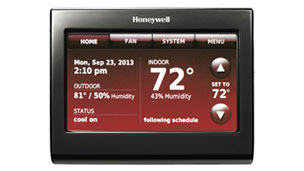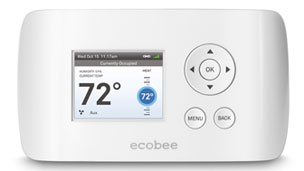The lowly thermostat is the latest household device to undergo a high-tech makeover. Offering the promise of increased energy efficiency and control, here are three models that are spearheading thermostats' evolution into much more than just a simple box. 1. The Nest Learning Thermostat
Leading the way is the Nest ($249), which evaluates indoor and outdoor temperatures, whether anyone is home (with light and motion detectors) and the temperatures chosen in the past, to "learn" patterns and then fine-tune its control of heating and cooling functions. Nest Labs was founded in May 2010 by two former Apple executives who managed the development of the iPod. About the size and shape of a hockey puck, the Nest thermostat has a sleek and modern style, and can be controlled remotely by a mobile device or computer. | 
| 2. Honeywell Wi-Fi Smart Thermostat with Voice Control
Scheduled to go on sale in November, the Honeywell Wi-Fi Smart Thermostat with Voice Control ($349) can be adjusted by talking to it from up to 25' away. Users say, "Hello, thermostat" to get its attention. Telling it "make it warmer" or "colder" adjusts the temperature a degree; saying "much warmer" or "much colder" adjusts it four degrees. The Honeywell can be also adjusted remotely using a mobile device or computer, and it "learns" based on weather and household usage patterns -- but it doesn't detect whether anyone is home. A rectangular box, it includes a color touchscreen that can be customized to match the room decor.
| 
| 3. Ecobee Smart SI Thermostat
The Ecobee Smart SI Thermostat ($170-$209) has more traditional-looking manual controls on a rectangular box. It can be controlled by a mobile device or computer, and it monitors weather reports and "learns" from overall household usage, but it doesn't detect whether anyone is home. It does provide automatic alerts when it's time to change the filter or have the equipment serviced, a feature not included on the Nest and Honeywell models. |  |
These three are obviously the start of a competition to capture market share for increasingly smart household devices. Nest Labs is already working on a smart smoke detector that will share information with its thermostat, and is preparing to open up its programming so other developers can create products that interact with the Nest thermostat. The question is whether most homeowners will be willing to pay $200 to $350 or more for these enhanced features on the previously unexciting household thermostat.
|